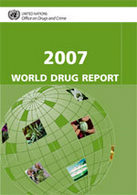2007年VOA标准英语-UN: Afghan Poppy Harvest Growing Rapidly(在线收听)
Washington
26 June 2007
Afghanistan's poppy harvest is growing rapidly and this year's yield could exceed last year's record crop. Top counter narcotics officials from the United States and Britain say Afghanistan's growing trade in illegal drugs is firmly linked to the Taleban insurgency. VOA correspondent Meredith Buel has more in this background report from Washington.
 |
| UN's 2007 World Drug Report |
The report says more than 90 percent of the world's heroin now comes from poppies grown in Afghanistan.
The U.S. Director of National Drug Control Policy, John Walters, says many farmers in Afghanistan are being forced to grow poppies. "Many of those people do not decide what they grow. They are told, as sharecroppers, what to grow, sometimes by corrupt landowners, sometimes by corrupt warlords and tribal leaders, sometimes by people like the Taleban at the point of a gun - you will grow poppy here - you will not eradicate your poppy if you start growing it or we will kill you and your family," he said.
The U.N. report says Afghanistan's Helmand Province, which is largely under Taleban control, is becoming the world's largest drug supplier.
Poppy cultivation in Helmand grew significantly last year, with illegal harvests there larger than in the rest of the entire country.
Britain's Minister of State responsible for Afghanistan and counter narcotics, Kim Howells, says there is a clear connection between the Taleban and the growth in poppy production.
"The Taleban's relationship with drug traffickers is becoming closer. We are seeing a clear overlap, indeed extensive financial and logistical links between the drug trade and the Taleban insurgency. Traffickers and the Taleban have a mutual interest in resisting the Afghan government's authority and international forces," he said.
The U.N. says opium production in Afghanistan grew to more than 6,000 tons last year with a value exceeding $3 billion.
Officials say a significant portion of the profits flow to Taleban fighters, who tax and protect poppy farmers and drug runners.
The head of America's effort to reduce the supply of illegal drugs, John Walters, says the Afghan government has little authority in the areas where the poppies are grown.
"The government can't regulate, can't produce rule of law because of the terrorists and the warlords and the drug traffickers. A regulated market requires the ability to regulate and it is precisely the inability to regulate that causes the opium problem as it currently exists," he said.
U.N. officials say Afghanistan's drug trade is becoming more sophisticated. Laboratories inside the country are now converting 90 percent of the opium into heroin and morphine before smuggling it around the world.
They say this year's poppy harvest could top last year's crop because weather conditions have been favorable for agriculture.
British counter narcotics official Kim Howells says dealing with Afghanistan's poppy production is critical to the nation's future. "The trade in opium feeds the evil of corruption that together are the most corrosive elements in Afghan society. It is impossible to tackle Afghanistan's problems today, if we put off dealing with the drugs menace until tomorrow. Drug related crime and corruption are rife and permeate all levels of society," he said.
The U.S., British and Afghan governments have launched a number of programs designed to eradicate the poppy crop, including public information campaigns, alternate jobs programs for farmers and reform of the country's law enforcement and judicial systems.